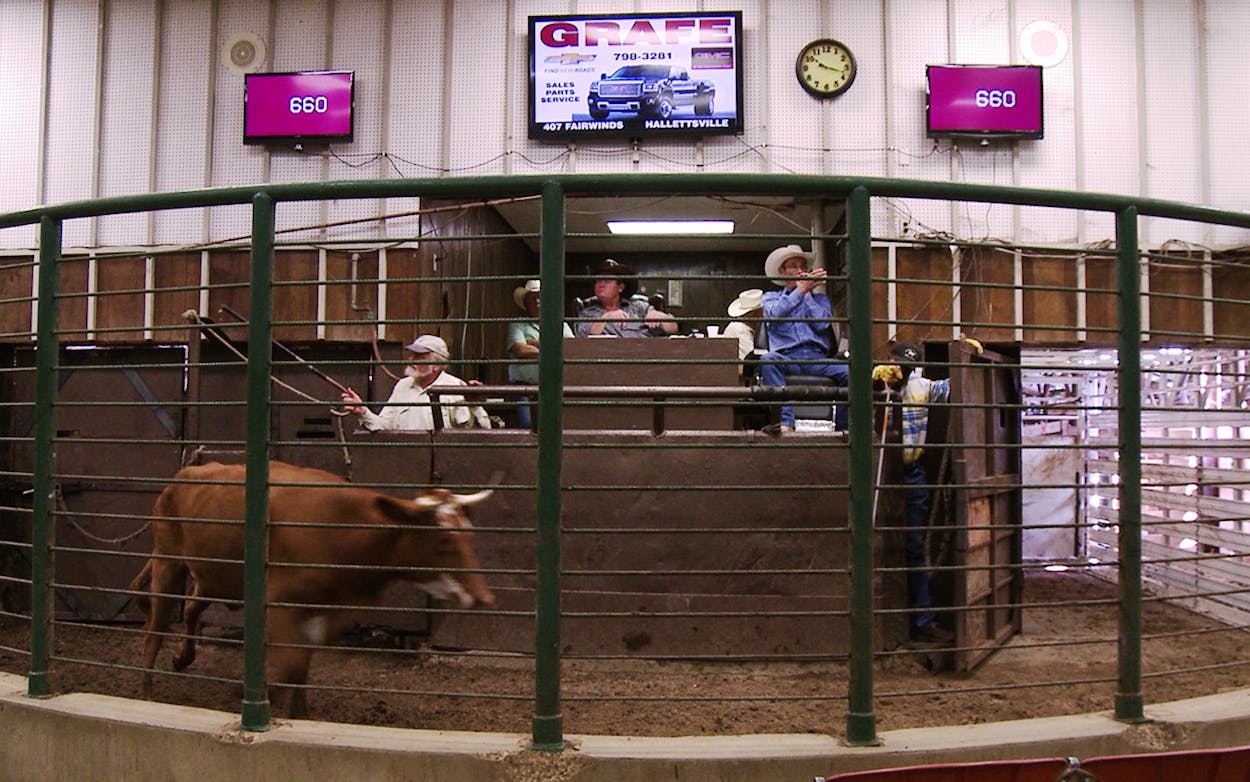In Gonzales, the cattle business isn’t what it used to be. The once vibrant town square sits eerily silent. The children of ranchers set out to seek their fortune in bigger cities far from home. The city has undergone the unhappy transformation of many Texas towns, but its cattle auction maintains the legacy of Gonzales’s history as a bustling county seat.
In 2014, Joel Fendelman, then a student in the film program at UT Austin, spent several days with the attendees at the weekly Gonzales Livestock Market for his short film, Auction. (Fendelman also directed Man on Fire, a documentary film based on the self-immolation of Charles Moore, which Michael Hall wrote about for Texas Monthly in 2014.) Amid the rapid auctioneering and jeans worn over cowboy boots in Gonzales, the filmmaker captured a small-town tradition that’s fading fast. Watch the film here, and read about what Fendelman learned from the Gonzales auction below.
Texas Monthly: How did you first hear about the cattle auction in Gonzales?
Joel Fendelman: A family friend who was living in Austin told me about these auctions that happened in different parts of Texas. He mentioned this one that he had been to in Gonzales, and it sounded really interesting, like it was from another time, from the 1950s and ’60s and ’70s. It was an hour and a half from Austin, so I drove out there and hung out for the day. That was my first experience. I remember walking in, and some guy was like, “Oh, we’ve got a foreigner here.” It was totally lovely and friendly, but it just set the mood. Clearly I am not from Gonzales, Texas.
TM: Was that soon after you moved to the state?
JF: I had just been in Texas a couple weeks at that point. I grew up in Miami, spent most of my life in New York City, and came to Austin to get my master’s at the University of Texas in 2014. The first project I did was Auction, as a short film for my documentary class.
TM: What was the auction like, as a newcomer to Texas?
JF: When you get out into East Texas, in some ways it’s kind of desolate. There’s not a lot going on—there are gas stations, there’s lots of dollar general stores. The cattle auction wasn’t on my GPS, so I was going around for an hour looking for where the thing was. I went to a couple wrong locations before I finally pulled into a gas station and asked someone. You walk in and things have not changed since the place opened. There are these beautiful photographs all along the wall that capture the history of the cattle auction at different phases, over the 50 or 60 years it’s been open. The same guy—the head auctioneer—has had it for quite a long time. He smokes a million cigarettes and has this deep, gravelly voice, talking real fast as people make signals that they want to buy that cow. It’s a total scene. I knew lots of people hadn’t experienced that, and since it was interesting to me, I figured it must be interesting to many other foreigners who haven’t seen it.
TM: What were some surprising moments from filming?
JF: There are a couple shots I got where I was able to climb up on top of where the auctioneer is and stand behind him and film. I was really close to the cattle coming in as they [went through the gates]. They were intense. They’re 600 pounds and they’re really powerful. As these bulls and cattle came in making a ruckus, I was a couple feet away at some points. It was surprising to see the intensity these animals have.
TM: You said earlier that before you visited, you imagined the auction was from a different time. Did you walk away from it seeing it that way?
JF: Yeah, I walked away thinking it was a time capsule. I don’t think the cattle auction is going to be there forever. As you spoke to these people, you got the sense that this thing is going on now, but the cattle lands are being bought up. It doesn’t make sense economically for people to raise cattle on these lands—you make less and less. I don’t know how much longer that way of life is going to continue, and you got a sense of that. Everyone at the cattle auction was pretty old, and there wasn’t a younger generation partaking in it.
TM: What did you hope to capture in the film?
JF: I think it was just that. I was hoping to experience this way of life for myself and to capture it so other people can experience it. It’s something that may not be around for that much longer.
This interview has been edited for clarity and length.
- More About:
- Film & TV
- Filmmaker
- Documentary
- Gonzales






